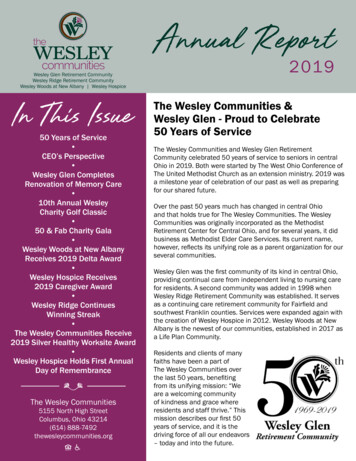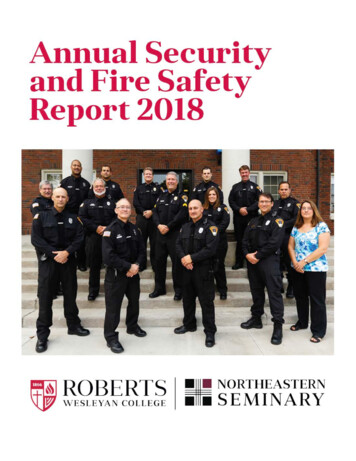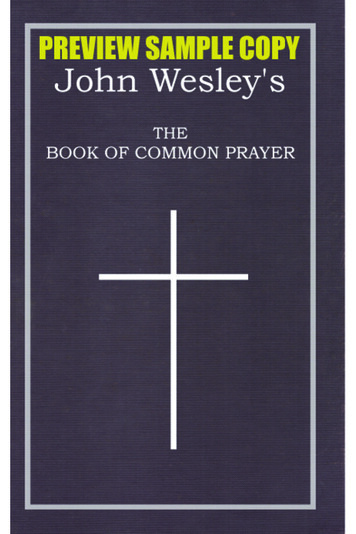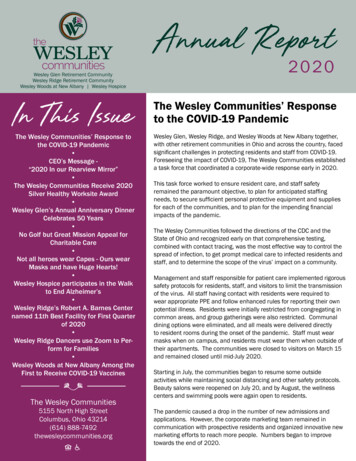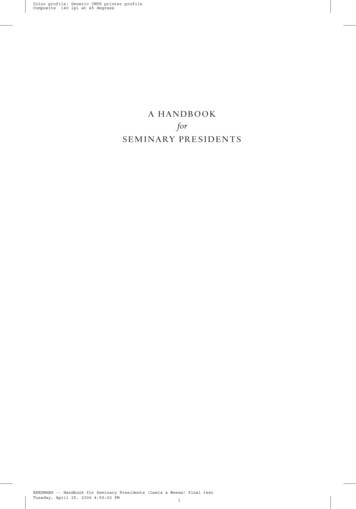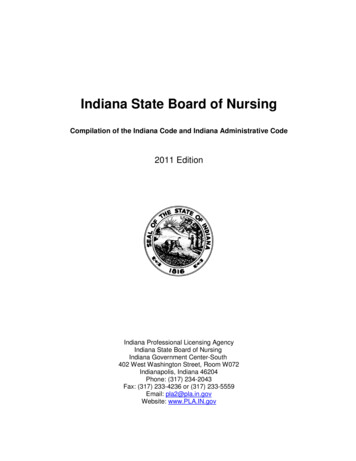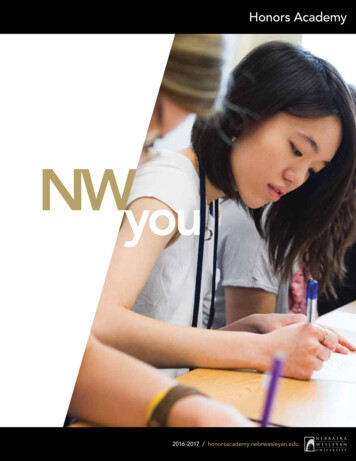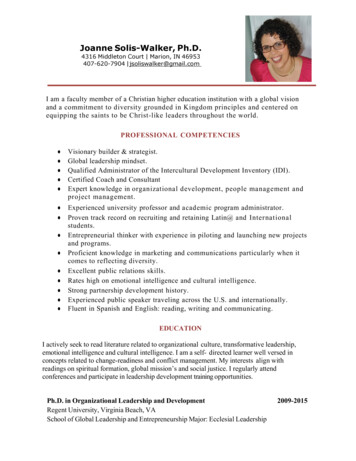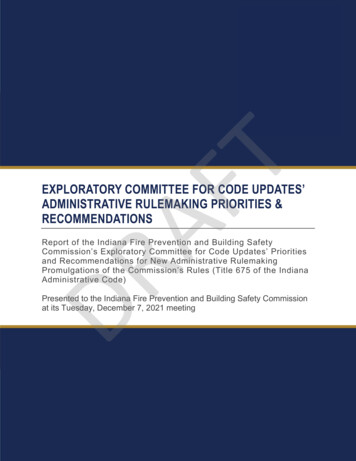
Transcription
Wesley Seminary at Indiana Wesleyan UniversityAssociation of Theological Schools Self-StudyWinter 20141
Table of ContentsIntroduction3Section 1: General Institutional Standards1. Institutional Purpose and Evaluation2. Institutional Integrity3. The Theological Curriculum4. Library and Information Resources5. Faculty6. Student Services7. Authority and Governance8. Institutional Resources410132224283438Section 2: Educational and Degree Program StandardsA. Educational Standards1. Degree Programs and Nomenclature2. Main Campus3. Extension Education4. Distance Education5. Faculty-Directed Instruction6. Assessment of Outcomes7. Admission8. Non-Degree Programs4547485256576768B.1.2.3.707375Degree Program StandardsMaster of Arts in MinistryMaster of DivinityMaster of Practical TheologySelf-Study Conclusion78AppendicesA. University and Seminary Organizational ChartsB. Broader University Aims and OutcomesC. Seminary Faculty By-LawsD. Faculty HandbookE. Degree OutcomesF. MA, MDiv, MPTh CurriculaG. Fall 2013 Financial ReportH. Student Evaluation InformationI. Assessment RubricsJ. Full-Time Faculty828385901051061221251361402
IntroductionHistory of the SeminaryIndiana Wesleyan University itself (IWU) was founded in 1920 as “Marion College” and is anevangelical Christian comprehensive university committed to liberal arts and professionaleducation. The university at large has around 15,000 students and is thus the largest privateuniversity in the State of Indiana. Over 3000 currently attend its Marion campus. MarionCollege received its initial accreditation from the North Central Association of Colleges andSchools in 1966. It has remained in good standing ever since and had its last visit from theHigher Learning Commission within North Central in 2010.A strategic decision in the early 1980s greatly set the trajectory of the university toward what itis today. Having established itself as a solid liberal arts college, the university began offeringcourses and degrees to working adults during evening hours and Saturdays. This movementtoward innovative adult programs resulted in a sharp enrollment growth that radicallytransformed the institution.In more than two decades, IWU’s enrollment jumped from 1,087 to approximately 15,000.Within the state of Indiana, IWU has been the fastest-growing university and the largest privateuniversity in total enrollment. It is the largest school in the Council for Christian Colleges &Universities. It has some 12,000 adult learners at regional sites throughout Indiana, Kentucky,and Ohio, and online.Another key decision in our history took place in 1997 when IWU decided to move into thearena of online education. While the addition of adult education set a trajectory toward rapidenrollment growth for the university, the move into online education accelerated this growthsignificantly. Of the 12,000 adult learners currently within the university, about 7,500 are online.Theological education has always been a prominent feature of IWU. The Master of Arts (MA) inMinistry, which is now part of the seminary, commenced in 1979. In those days, it was onlyavailable for those who lived within driving distance of the college. Then in the 90s, ittransformed into a program based on one week intensives that allowed individuals to take thedegree while living at some distance from the university.In 2004, then Director of Graduate Ministry, Dr. David Wright, reformulated the degree into aformat similar to that of IWU’s College of Adult and Professional Studies, a decision thatrejuvenated the degree. Students would now proceed through a more fixed curriculum incohorts, and the degree would be available online. Concentration tracks in Leadership and YouthMinistry were created. The program at that time had a single full-time professor in Dr. BobWhitesel. The majority of the courses were staffed by adjuncts, including a significant number ofindividuals from what was then the undergraduate Division of Religion and Philosophy.The question of whether IWU should start a seminary had surfaced several times in the 80s and90s. The Wesleyan Church, the parent denomination of IWU, had never had its own seminary.Rather, for those ministers who chose to get a seminary degree, it relied on outside seminaries ofa kindred theological spirit, like Asbury Theological Seminary. In the early 80s and late 90s,3
various task forces had explored and affirmed the idea that The Wesleyan Church might have itsown seminary, but had not considered the financial situation appropriate to pull the trigger.In 2006, as President-elect Henry Smith was preparing to assume the presidency of theuniversity, he initiated a number of conversations to consider whether the time might finally beright to found a seminary at IWU. Both the undergraduate Division of Religion and Philosophyand the Department of Graduate Ministry with its MA unanimously supported the idea. In fact,the Director of the MA at that time, Russ Gunsalus, was half-time in the undergraduate college inaddition to directing the graduate program in ministry.At a meeting to show support for the initiative, these two groups came together and unanimouslyput forward a series of potential distinctives that did in fact carry over into the DNA of whatwould become Wesley Seminary at Indiana Wesleyan University (WS). It would be missionaland kingdom focused. It would be accessible, application focused, spiritually formative, andinnovative. It would add value to people already in ministry, with high quality teaching and aglobal reach.President Smith proceeded cautiously. He easily secured the good will of the leaders of theWesleyan denomination. In the summer of 2007, he appointed Dr. Ken Schenck to lead a taskforce to design an innovative Master of Divinity degree, without necessarily assuming it wouldeventually be housed within a seminary. He did not even assume initially that it would be locatedwithin the existing Department of Graduate Religion. President Smith charged the group todesign a degree that looked like where seminary education was headed, rather than where it wasat the time.The MDiv Task Force met over the summer of 2007 and received internal academic approval forthe degree in August 2007. In the Spring of 2008, Director Russ Gunsalus brought the membersof the original task force back together to begin to design the initial courses of the degree itselfwithin the Department of Graduate Ministry. Because online courses at IWU are fully designedbefore a class begins, the entirety of the first classes had to be developed in detail in advance. Atthe same time, because MDiv students would go through the program in a set sequence, only thefirst courses had to be ready to initiate the program.Meanwhile, in the Spring of 2008, President Smith appointed another task force, a SeminaryTask Force with broad representation, to begin exploring the formation of a seminary withinwhich to house the new MDiv degree and the long-standing MA degree. In August of that year, asite visit by the Higher Learning Commission took place to determine whether or not IWU wasready to offer its first professional master’s degrees. In January of 2009, the Higher LearningCommission officially approved the new Master of Divinity degree, making it a fully accrediteddegree within the university.Accordingly, the IWU Board of Trustees officially voted to create a new seminary in April 2009.In August 2009, 30 new Master of Divinity students joined 170 students enrolled in the existingMaster of Arts in Ministry degree. The new seminary was officially named “Wesley Seminary atIndiana Wesleyan University” at the Fall board meeting that year, and Wayne Schmidt came onboard as its first full-time chief executive in January 2010.4
Most of those initial MDiv students graduated in August of 2012. Since those students hadalready completed their work in the Spring (and since IWU has had graduates of the MAprogram since the early 80s), Wesley was successfully able to apply to become an AssociateMember of the Association of Theological Schools at its June 2012 meeting. We submitted ourInternal Readiness Report in the Fall of 2012, which led to a site visit by Dr. Tom Tanner in theFall of that year. Subsequently, the Board of Commissioners gave us permission to begin ourself-study in pursuit of accreditation, which was submitted in December 2013.The distinctive features of Wesley’s ethos and curriculum will become apparent in the pages thatfollow. Former President Smith used to describe its distinctiveness in terms of it being “practical,accessible, and affordable.” It is indeed accessible. The demand for our degree is primarilyonline, with almost 90% of our students opting to take the degree in that format. It is affordable,with about 90% of our students receiving aid of some sort. Many students are able to attend at asubstantially discounted rate.It is designed to be very practical in orientation. Students in the MDiv program are expected tointeract with a local church as part of their course work. Even our Bible, theology, and churchhistory components are heavily integrated and embedded within the praxis courses. Thisarrangement contrasts with most curricula, where they are distinct courses that exist more or lessin disciplinary silos. These core, 6 credit hour courses on the practice of ministry are teamtaught, with two-thirds of the course focused on praxis and one-third on the integration of Bible,theology, and church history with that practice of ministry.The result is a degree that brings ministerial education and training to the minister, rather thanforcing the minister to come to the seminary. It is education aimed primarily at the person who isalready in ministry, with the majority of students being individuals who would not likely haveever gone to seminary otherwise. At the beginning of our fifth year, our student enrollmentpassed 400 and continues to grow.Self-Study ProcessSince this self-study is the first one made to the Board of Commissioners, it follows fairlyquickly on the heals of the Internal Readiness Study composed in the Fall of 2012. In essence, itis an expanded form of the Internal Readiness Study, with a much more detailed consideration ofeach category and the inclusion of assessment data. After the Board of Commissioners grantedWS permission to conduct its self-study, the academic Dean of the Seminary, Dr. Ken Schenck,was tasked to oversee and write the report. Dr. Schenck had composed the Internal ReadinessReport and had a detailed knowledge of the Seminary since its very beginnings.The writing of the self-study proceeded as follows. Dr. Schenck made initial drafts of itschapters, soliciting any needed data from appropriate individuals within the broader university.WS is of course an embedded seminary, so it relies heavily on the services of other offices withinthe university at large. At times Dr. Schenck sent relevant paragraphs directly from the GeneralInstitutional Standards to key individuals and asked them to respond within their area ofexpertise. Such individuals included Dr. Don Sprowl, Assistant Provost for InstitutionalResearch and Accreditation; Sue Melton, Associate Vice President in the Office of Student5
Services; Dr. Larry Lindsay, Interim Provost; Dr. Thomas Ratliff, Associate Vice President inthe Office of Financial Aid; Dr. Jule Kind, Director of Off-Campus Library Services; andTiffany Lewis, Controller, to name a few. Karen Clark, Coordinator of Operations in theSeminary, was also instrumental in seeing the process through to completion.As portions of the self-study were completed, they were run by the faculty and the leader of theSeminary, Dr. Wayne Schmidt, Vice President for Wesley Seminary. Many edits andimprovements were suggested and made over time. At the October meeting of the SeminaryBoard, a draft of the conclusions of the self-study were presented to the Seminary Board, whichwas very positive toward its general findings.By far the most intensive work in relation to the self-study, however, was the collection andanalysis of formal assessment data. Informal assessment is part of the warp and woof of theSeminary, a part of every day of the Seminary’s existence. Professors and administration alikeare constantly soliciting feedback, observing what works and what does not, and makingadjustments continuously.We have also been working slowly on setting up the structure of assessment for several years. In2010, the Dean and a professor were trained by Chalk and Wire on how to set up athoroughgoing assessment program. Due to changes within IWU, this system was never fullyimplemented, but it created a structure of assessment that flowed directly into the work of theself-study.Due to a complication in a recent year within our Information Technologies department (IT),data from previous courses was not as quickly and easily available as we had thought.Nevertheless, due to the efforts of IT, with the help of professors with student artifacts stillavailable, and in some cases even by solicitation from former students themselves, we were ableto resurrect a sufficient amount of data to assess student learning formally within the seminary.Several faculty members helped with the assessment.The end result of the self-study is a strong endorsement of what we are doing. The seminarybegan with a successful model that is ongoing and expanding. As we have progressed, areas ofneeded improvement have been recognized, and we do our best to address them as they arise.Changes are being implemented even now as a result of this self-study. It is a never-endingprocess that will continue for the life of the Seminary.6
Section 1General Institutional Standards7
Chapter 1Institutional Purpose and EvaluationInstitutional PurposeThe Mission Statement of Indiana Wesleyan University (IWU) indicates that, “Indiana WesleyanUniversity is a Christ-centered academic community committed to changing the world bydeveloping students in character, scholarship and leadership.” This statement has thoroughlyinformed the identity of IWU since its adoption as a mission statement in 2002.For over a decade, the idea of being “world changers” has been integral to the identity of IndianaWesleyan University. Then President James Barnes signaled how important the new missionstatement was going to be for the university by giving 5 dollars to anyone at random who couldquote the statement from memory. An orientation course, “Becoming World Changers,” becamea requirement of all incoming freshmen. The Board of Trustees inaugurated the “Society ofWorld Changers” and every year inducts a new member as an example of a Christian who hashad a significant impact for good in the world.The categories of character, scholarship, and leadership flow directly from the university missionstatement. These categories are part of the warp and woof of university assessment, as one cansee from the way the Graduate School Outcomes of Appendix B have integrated them into itsoverall rubric. The year after the university adopted this mission statement, it approved theWorld Changing Aims, also in Appendix B. All the assessment of the university ultimatelyconnects to these aims.In the strategic planning of 1998-2000, Christlikeness became the fundamental value of IndianaWesleyan University. It has remained the university’s core value ever since. Then additionally,in the years 2006-2008, innovation and diversity were added to the core values of the university.The Mission Statement of the Seminary follows the trajectory of the broader university. Thecatalog states that, “Wesley Seminary at Indiana Wesleyan University is a Christ-centeredacademic and ministry community committed to changing the world by equipping pastors andchurch leaders to minister more effectively for the Kingdom of God in the church and the world,to embody the Good News of Jesus Christ, and to cultivate personal, spiritual transformation.“It is our commitment to participate in the missio Dei with accessible and economical deliverysystems and courses that are spiritually formative and content-rich, emphasizing the practice ofministry in dialog with solid theory and the foundational disciplines of the Bible, Christiantheology, and church history.”Like the broader university, we aim to be a community, not merely an organization or institution.We are clearly an academic community, like the broader university, and the broader universityalso sees itself as missional. Nevertheless, the Seminary’s mission statement is more explicitabout the missional nature of our identity. We are a ministry community as well as an academiccommunity. Our focal audience consists of pastors and leaders in the church. Our objectivesrelate directly to the Kingdom of God in the church and the world.8
The mission statement also alludes to some of the curricular distinctives of the Seminarycurriculum. The Seminary is committed to affordable and accessible degrees. Accessiblegenerally means bringing the education to people rather than making them come to us. IWU’sonline expertise and the offering of intensives at various locations around the world are key tolong-term accessibility of education.The mission statement also mentions a commitment to degrees that are spiritually formative.While our degrees are clearly academic and cognitive, we are committed to a robust affectivedimension to our program through spiritual formation. Further, the Seminary emphasizes the“practice of ministry” in its focus, doing the work of the ministry (cf. Eph. 4:12). This isformation of the whole person—in work, in thought, in attitude and character.A final distinctive of the Seminary mission is to integrate theory with practice. In particular, theSeminary seeks to integrate biblical, theological, and church historical foundations andantecedents with the practice of ministry. We value integration and connection of disciplinesover and against the siloing that is more typical of academic institutions, while also valuingdistinct disciplinary expertise.Curricular ValuesThe creation of the Seminary coincided with the inauguration of the Master of Divinity degree,although the university had offered a successful Master of Arts degree with concentrations inleadership and youth ministry for many years. The creation of the M.Div. degree brought with ita restatement of values that are the overall curricular values of the Seminary in general. Beloware the curricular values as they were approved in relation to the M.Div. degree in the Fall of2007.1. Missional/Kingdom Focused – The degree will focus on serving the kingdom and creatingworld changers more than serving itself or its own disciplines. It will advance His kingdomfirst and in so doing advance the mission of Indiana Wesleyan University and The WesleyanChurch.2. Accessible – The degree will not be exclusivist but will rather commit insofar as is possibleto inviting ministers of any culture, gender, race, class, ability and nation to participate,thereby increasing their educational level and ministry expertise. It will be conveniently andeconomically accessible for persons currently in ministry, persons called to a second careerin ministry, and the recent undergrad.3. Application Focused – The degree will approach the disciplines combining various theoriesof adult education with ample opportunities to apply academic theory to the practice ofministry in the church. The curriculum is shaped by and arises from the grass roots goals andproblems of ministry.4. Spiritually Formative – The degree will not only develop the theoretical understanding andpractical skills of the minister, but consistently will engage the student in spiritual formationtoward increased wisdom, holiness, and sensitivity to the Holy Spirit.9
5. Innovative – The degree’s program will be unique, innovative, and responsive throughmultiple delivery systems and creative curriculum while at the same time accomplishing thechief goals of all Masters of Divinity degrees—equipping ministers with the tools of mindand heart to be effective in an increasingly complex world and church.6. Value Adding – The degree will add significant educational value to students to upgrade thequality and excellence of their professional ministry practice and leadership, the ministries oftheir church, and the quality of the laity in their churches.7. High-Quality Teaching and Learning – The degree persistently pursues and assessesexcellence in teaching, learning and scholarship. Professors are continually empowered toimprove their teaching effectiveness in order to maximize student learning andtransformation.8. Global – The degree is both scalable for expansion around the world and sensitive to theintercultural competencies necessary to equip pastors and church leaders appropriately forministry in an increasingly interconnected, complicated, diverse, and shrinking world.These values have been variously packaged since the inception of the Seminary, although theyhave remained constant. Former President Henry Smith used to summarize the overalldistinctions of the Seminary as “practical, accessible, and affordable.” The following list reflectsthe overview of the MDiv program values as they have been presented to every incoming MDivcohort and as they have been promoted in our advertising since the Seminary’s inception: Wesley Seminary is missional. To be missional is to focus on what God wants to do inthe world rather than on what helps our cause. It does not drive a wedge between helpingthe soul and helping the body. It affirms God’s desire to transform the structures ofsociety, not just individuals. The MDiv has a local church focus. This relates to the curricular value of beingapplication-focused and, thus, practical. The MDiv aims at collaborative learning. Students proceed through the program incohorts, including the sequence of six, one credit hour, spiritual formation courses. Thecore MDiv praxis courses are team taught. The MDiv curriculum is integrated. The notion of “praxis” presumes that practice isinformed by theory. Practice is also integrated with the biblical, theological, andhistorical foundations of ministry. Further, spiritual formation is integrated alongside thecognitive and practical. Wesley Seminary is spiritually-focused. Spiritual formation courses are offeredalongside courses focusing more on the cognitive and the practical. Wesley Seminary is accessible and affordable. While these are more institutionalvalues than curricular values, they have a significant impact on the success of thecurriculum.Signature AreasIn the Fall of 2011, the Board of Wesley Seminary at IWU identified five priority areas of“signature service” or strategic emphasis for the Seminary, areas on which to focus in the lead up10
to 2020. These areas seem best to serve the prioritized needs of The Wesleyan Church and thebroader church.1. Church multiplication – the equipping of ministers for leadership in church planting andmultisite venues. This requires proper assessment of suitability for such a ministry, exposureto varied and flourishing models of multiplication, and an orientation to the principles andprocesses of development of new churches and/or venues. An academically qualified,experienced practitioner is giving additional input into the content of this potentialspecialization, to be embedded as a possibility within the MDiv degree, with a launchplanned for the latter part of 2014.2. Church revitalization – thousands of North American churches are in decline as they enterthe later years of their life cycle. We will seek to equip ministers to lead churches torevitalization through a specialization within the MDiv degree that includes both“incremental” and “intervention” approaches, to embrace a new future of missionaleffectiveness. A pilot project is being designed for testing in 2014 with the emphasis to belaunched in 2015.3. Ethnic & Multiethnic ministry – opportunities are proliferating as the population of NorthAmerica becomes more diverse and international. We will continue to build on the earlysuccess of a contextualized African American urban MDiv (launched in 2012) and M.A. inMinistry with a focus on leadership (launched in 2013), both in partnership with Bishop TomBenjamin. We will also continue development of the hybrid (online with onsite intensives)Spanish MDiv, seeking to expand its enrollment in service to the Hispanic Church throughintensive sites in additional Hispanic population centers in North America.We have partnered with leaders in the national multiethnic ministry movement such as MarkDeYmaz and Alvin Sanders to understand the dynamics of pastoral leadership in multiethniccontexts and churches. This groundwork is leading to a potential specialization within ourSeminary degrees, being launched in 2015.4. International Ministry Education – our hybrid M.Div. is accessible and can be contextualizedfor graduate pastoral education globally. A draft of an International Ministry Educationstrategic plan was presented to the Seminary board, and included a pilot project of aColombian-based intensive launched in August 20135. Teaching Church partnerships – we believe that some of the most practical and effectiveministry education will take place in partnership with and in the context of the local church.Our pilot partnership with 12Stone Church in Atlanta was launched in June 2013 with theMA in Ministry (leadership concentration) intensives on location at 12Stone, combined withonline learning. The Seminary board has identified criteria for future Teaching Churchpartnership within The Wesleyan Church and with other like-minded evangelical churches,seeking to add one a year over the next five years.11
Denominational IdentityIndiana Wesleyan University is owned by The Wesleyan Church. It thus officially holds to thedoctrines and teachings of The Wesleyan Church, as found in the denomination’s Articles ofReligion. The denomination has representation on the Board of Trustees and holds ultimateauthority over the trajectory of the university. The denomination does not wield this authority ina domineering way, but the connection between IWU and The Wesleyan Church is stronger thanthe connection many church affiliated schools have with their denomination.Professors must agree to teach and live within the limits of Wesleyan identity. Fifty percent ofall full-time faculty in the university must be Wesleyan in denomination. In the undergraduateSchool of Theology and Ministry, sixty percent of the faculty must be Wesleyan. All leadadministrators within the university must be Wesleyan unless a special exception is granted bythe church. All faculty, administrators, and staff must respect Wesleyan theology, and all those inthe Seminary who are full-time faculty or administration must broadly hold to it. Because theSeminary is currently categorized as a graduate school, fifty percent of its faculty must beWesleyan in denomination.While these parameters may seem restrictive, it is actually an essential element of Wesleyanidentity to be catholic in spirit, as John Wesley’s sermon, “Catholic Spirit” indicates. That is tosay, to be Wesleyan in spirit means to include and respect those from other Christian traditionswho may disagree with our way of thinking. This position is not pluralistic. That is to say, it doesnot take the position that all positions are of equal value or truth. It simply does not consider itappropriate (or possible) to force others to conform to our perspective. It is consistent with ourbelief in God-empowered free will.Several other distinctive features of Wesleyan thinking shape the mission and values of theSeminary. The Wesleyan Church believes that God calls women to all levels of leadership in thechurch. In fact, the highest leader in our denomination is currently a woman, Dr. Joanne Lyon.We therefore seek to encourage any women who feel called to ministry to be part of ourSeminary and insist that all faculty, full time or adjunct, fully respect and encourage suchstudents.It is strongly in keeping with the history of the Wesleyan Church that we would stand for theministerial training of people of all races and places, especially those to whom access toeducation has not always been forthcoming. John Wesley stood with the coal miner and, whenforced, worked outside the established church to minister. The Wesleyan Methodist Churchstarted as an abolitionist movement. So it is no surprise that we offer the M.Div. entirely inSpanish or that we have a contextualized urban cohort meeting in Indianapolis. We areincreasingly reaching out globally to individuals who would not normally receive a seminaryeducation.Following in Wesley’s footsteps, it is not surprising that we would seek ways to bringtheological education to those who need it rather than expecting them to come to us. It fits wellthe spirit of Wesley that we would specialize in online ministerial training and that we wouldpartner with teaching churches. Wesley did not write a systematic theology but used a collectionof standard sermons to instruct those in his renewal movement, starting small class meetings for12
discipleship and accountability. Again, it is no surprise that Wesley would create a program thatrequires students to engage local churches as part of the curriculum or that we would identifychurch multiplication as a signature area of emphasis.Institutional EvaluationEvaluation takes place in the Seminary on a number of levels: 1) institutional, 2) administrative,3) faculty, 4) degree program, and 5) course assessment. Institutional evaluation pertains to theoperations of the Seminary within the broader university. Administrative and faculty assessmentrelates to the performance of these particular individuals within the Seminary. Degree programassessment relates to the learning outcomes of the MDiv and MA degrees as a whole. Finally,course assessment relates to
College received its initial accreditation from the North Central Association of Colleges and Schools in 1966. It has remained in good standing ever since and had its last visit from the . Indiana Wesleyan University" at the Fall board meeting that year, and Wayne Schmidt came on board as its first full-time chief executive in January 2010. 5
